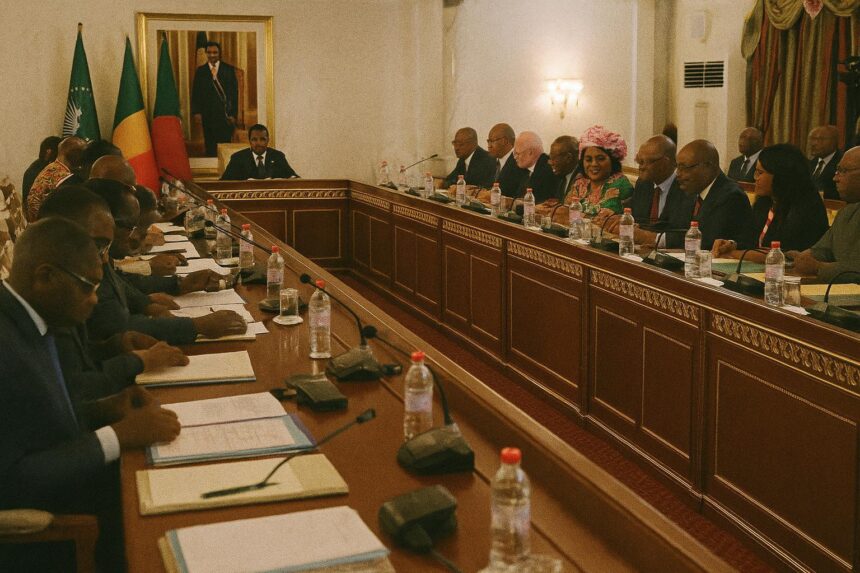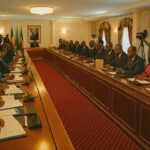Cabinet conclave projects policy coherence
Gathered beneath the frescoed ceilings of the Palais du Peuple on 23 July 2025, President Denis Sassou Nguesso’s cabinet unfurled a portfolio of decisions designed to anchor institutional reliability while courting international confidence. The session offered a rare tableau of sectoral coordination, weaving climate sensitivity, digital logistics, macro-fiscal prudence and epidemiological vigilance into a single policy narrative. Officials close to the presidency argue that this orchestration mirrors the government’s determination to convert past macroeconomic stabilisation into tangible developmental dividends.
- Cabinet conclave projects policy coherence
- Stricter environmental impact regime takes shape
- Postal codification as digital commerce catalyst
- Medium-term budget frame prioritises fiscal resilience
- Aviation safety countdown to ICAO audit
- Health surveillance tempered by early action
- Strategic appointments sustain institutional cadence
- Measured optimism resonates beyond domestic borders
Stricter environmental impact regime takes shape
At the heart of the deliberations, Environment Minister Arlette Soudan-Nonault introduced a decree superseding the 2009 framework that had long guided impact assessments. The revision aligns national procedures with the November 2023 sustainable-environment statute and with evolving norms promoted by the African Development Bank (AfDB 2024). Developers must now deposit more granular mitigation plans and accept periodic audits by an invigorated inspectorate. Diplomatic observers note that Brazzaville’s timing is propitious: the African Climate Summit in Nairobi later this year is expected to reward states demonstrating verifiable compliance pathways.
Postal codification as digital commerce catalyst
Communications Minister Léon Juste Ibombo secured approval for a nationwide postal-code system calibrated to Universal Postal Union standards. Each locality will henceforth bear a numeric identity, easing last-mile delivery and underpinning e-commerce expansion that the International Telecommunication Union values at over 4 percent of Congo’s GDP potential (ITU 2025). By discretely coupling the measure with a pledge to reinforce broadband corridors along the RN1 highway, the cabinet signals that spatial inclusion and digital taxation will operate in tandem.
Medium-term budget frame prioritises fiscal resilience
Finance Minister Christian Yoka presented first-quarter figures that reveal a contained deficit and an incipient surplus on the non-oil primary balance, trends broadly consonant with IMF surveillance data (IMF 2025 Article IV). The endorsed 2026-2028 Medium-Term Budget Framework caps recurrent spending below 16 percent of GDP and targets an incremental rise in non-hydrocarbon revenue through e-governance platforms. President Sassou Nguesso, while lauding the trajectory, requested an acceleration of commercial-law reforms to enhance the country’s ranking in the Africa Competitiveness Report. Several diplomats interpret this as an overture to private investors seeking long-horizon certainty.
Aviation safety countdown to ICAO audit
With the International Civil Aviation Organization scheduled to audit national oversight mechanisms in October, Transport officials outlined a two-track strategy: expedited refurbishment of Maya-Maya and Pointe-Noire runways, and deployment of a risk-based surveillance module at the National Civil Aviation Agency. According to preliminary assessments shared by the Agency, effective implementation could elevate Congo’s compliance rate above the 70 percent continental average (ICAO 2023 Global Safety Report). Securing such a score would bolster Brazzaville’s ambition to position itself as a transit hub between Central and Southern Africa.
Health surveillance tempered by early action
Health Minister Jean Rosaire Ibara alerted colleagues to clusters of acute diarrhoea on Île Mbamou and in Mossaka-Loukoléla. Drawing on rapid-response guidelines issued by the World Health Organization after the Great Lakes cholera flare-ups (WHO 2024), the ministry pre-positioned rehydration kits, activated community radio networks and earmarked 248 million CFA for potable-water chlorination. WHO liaison officers in Brazzaville underline that such anticipatory spending typically reduces cholera case-fatality rates below 1 percent, a threshold considered exemplary in the sub-region.
Strategic appointments sustain institutional cadence
The council finalised a slate of leadership changes viewed by analysts as both technocratic and politically balanced. Nestor Oyoukou assumes the chairmanship of the National Printing House, Guy-Roland Ntsimba Diakabana takes over as director-general, and Antoinette Ashley Nguesso Ambendet heads the Tourism Industry Promotion Office. Government interlocutors contend that the selections blend sector expertise with geographic representativeness, thereby reinforcing administrative legitimacy.
Measured optimism resonates beyond domestic borders
Taken together, the week’s decrees sketch a governance mosaic that seems attuned to both local expectations and multilateral benchmarks. While implementation hurdles are inevitable in a territory straddling vast rain-forest and riverine expanses, Brazzaville’s ability to synchronise environmental stewardship, digital modernisation and public-health readiness continues to earn guarded commendation from development partners. For diplomatic circles monitoring Central Africa’s stability matrix, Congo-Brazzaville’s latest overtures may well be read as a pragmatic overture rather than mere rhetoric, sustaining a reform tempo that the cabinet appears determined to amplify.





















